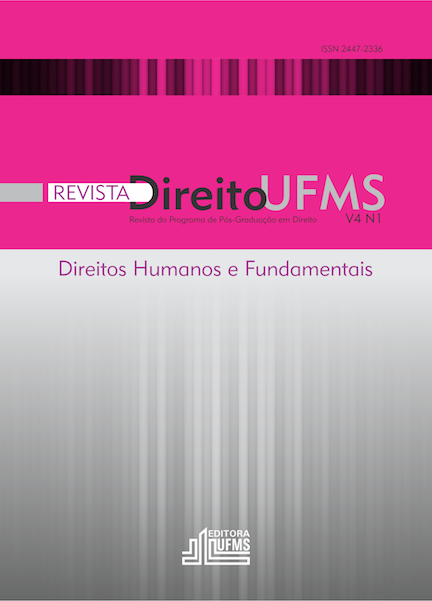KNOCKING AT THE DOOR OF THE AFRICAN COMMISSION ON HUMAN AND PEOPLE’S RIGHTS: HOW CAN THIS QUASI-JUDICIAL BODY BE BENEFICIAL TO MAURITIUS?
DOI:
https://doi.org/10.21671/rdufms.v4i1.5557Resumo
The Republic of Mauritius signed and ratified the African Charter on Human and Peoples’ Rights (hereafter the African Charter) in 1992. With this ratification, Mauritius committed itself to protect, respect and promote the three categories of rights provided by the African Charter. One key way of achieving a desirable and acceptable standard of human rights is by way of submitting communications relating to human rights abuses to the African Commission on Human and Peoples’ Rights (hereafter the African Commission) against a signatory state by individuals or Non-Governmental Organisations (NGOs). The paper illustrates that this quasi-judicial avenue has not
been effectively explored by Mauritians to enhance their human rights standards and to ensure that their legitimate expectations from the government are fulfilled. The word ‘enhance’ has been deliberately chosen as one could argue that Mauritians do enjoy a relatively higher standard of human rights compared to citizens of a majority of African states and it explains the fact that little
attention and importance are given to the African Commission. It is argued that there is always the possibility of enhancing human rights of people and Mauritian’s individual as well as collective rights can be further enhanced.
Referências
GAWANAS, Bience. The African Union Human Rights and its implementation mechanisms. 2009. Available at: <http://www.kas.de/upload/auslandshomepages/namibia/Human_Rights_in_Afric a/6_Gawanas.pdf>. Accessed 2 July 2017.
GEOFFREY, R. Who Owns Diego Garcia? Decolonisation and Indigenous Rights in the Indian Ocean. Western Australia Law Review, 2012.
GIFFORD, R. The Chagos Islands: The land where human rights hardly ever happen. Law, Social Justice & Global Development, 2004.
HALLBROOK, S. The Alienation of a Homeland: How Palestine Became Israel. Journal of Libertarian studies, v. 5, n. 1, 1981.
HEYNS, CH. The African regional human rights system: In need of reform? The African Human Rights Law Journal, v. 1, n. 1, 2001.
KENNEDY, J. The plight of Chagossians. 2014. Available at: <https://intercontinentalcry.org/the-plightof-the-chagossians-21653>. Accessed 2 July 2017.
LUNN, J. The Chagos Islanders. Commons Briefing Papers, 2012, Standard Note 04463.
MAHADEW, R. Does the Mauritian Constitution protect the right to privacy?: An insight from Madhewoo vs. The State of Mauritius. African Journal on Human Rights Law, 2017.
MAUGENEST, Denis; BOUKONGOU, Jean D. Vers Une Société De Droit En Afrique Centrale. Actes Du Colloque Des 14-16, Université Catholique D'afrique Centrale. Yaoundé: UCAC, Presses de l'UCAC, 2001.
NDULO, M. African Customary Law, Customs, and Women's Rights. Cornell Law Society Review, n. 187, 2011. Available at: <http://scholarship.law.cornell.edu/cgi/viewcontent.cgi?article=1186&context=facpub>. Accessed on15 July 2017.
PILGER, J. Stealing a nation. Chagos Documentary. Available at: <http://johnpilger.com/videos/stealing-a-nation>. Accessed 17 July 2017.
UMOZURIKE, U. O. The African Charter on Human and Peoples' Rights. Boston: M Nijhoff Publishers, 1997.
VILJOEN, F. Africa's contribution to the development of International Human Rights and Humanitarian Law. The African Human Rights Law Journal, v. 1, n. 1, 2001.
VINE, D, et al. Dérasiné: the Expulsion and Impoverishment of the Chagossian People. Unpublished Report, 2005.
ZAYAS, A. D. The right to one’s homeland, ethnic cleansing and the international tribunal of former Yugoslavia. Criminal Law Forum, v. 6, n. 2, 1995, p. 257-314.
Downloads
Publicado
Edição
Seção
Licença
Eu (Nós), abaixo assinado(s) transfiro(erimos) todos os direitos autorais do artigo intitulado (título) à Revista Direito UFMS- RDUFMSDeclaro(amos) ainda que o trabalho é original e que não está sendo considerado para publicação em outra revista, quer seja no formato impresso ou no eletrônico.
Temos ciência de que a revista se reserva o direito de efetuar nos originais alterações de ordem normativa, ortográfica e gramatical com vistas a manter o padrão culto da língua, respeitando, contudo, o estilo dos autores e que os originais não serão devolvidos aos autores.













